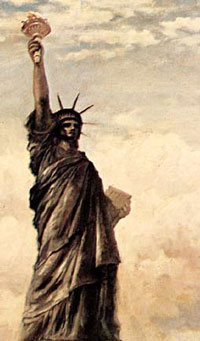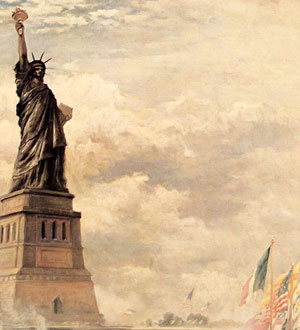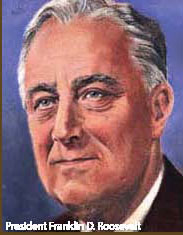
If you ask any group of Americans today what comes to mind when they hear the utopian metaphor of 'The Melting Pot,' you will hear as many different answers as there are cultures and inflections, including some who see the pot as boiling over, rather than melting in any tasteful or well-tempered recipe. When the phrase was first widely used as an arguably harmonious gesture during the great European immigration waves of the 18th and 19th centuries, this "Ellis Island Melting Pot" narrative was a healing and welcoming message for many immigrants who desired only to succeed in this new "land of the free and home of the brave."
Along with the theme of the Melting Pot was the ultimate ideal of achieving the American dream, which attracted millions of immigrants with the imperative and emotionally charged message that through hard work and determination, anyone could achieve freedom and financial prosperity.
Willing and ready to assimilate into the new country from "the old country," many Euro- immigrants realized this dream, literally "setting up shops," and neighborhoods where they continued to celebrate their individual cultures, but were also a part of the larger acculturated and expanded industrialized society.
However, the ideals of the American dream and Melting Pot did not stir up the same tasty aromas for many immigrants who came from countries outside of Europe.
For example, many Chinese immigrants met with extreme racial bigotry, including laws that excluded them from entering the country. The Chinese Exclusion Act, signed into law in 1882, excluded both skilled and unskilled Chinese laborers from entering the United States for 10 years under the penalty of deportation and imprisonment.
Yet, despite the hostility and racist measures, the Chinese population continued to increase, and reached its peak in 1890 with 107,488 Chinese Americans living in the U.S., according to the organizations, The National Archives and Record Administration, and Asian American History, Demographics, and Issues.
Chinese immigrants who managed to survive, eventually prospered by forming their own geographical borders of the now infamous Chinatowns across the U.S., to achieve and maintain their own version of the American Dream. This is not to say that European immigrants did not also experience their own brands of discrimination when they first attempted to assimilate into the American culture. Jews, Italians, Irish, Poles, and other groups also faced great challenges, but many realized the American dream during their first and second generations of life in the U.S.
According to studies compiled by the In Motion, the African-American Migration Experience, The Ellis Island Melting Pot, is rightly criticized for having ignored the plight and history, of the African-American people, who came to America not of their own volition, but via the Atlantic Slave trade, only to suffer cruel and unusual punishment, rape, torture, and death over generations. It was only as recent as the Civil Rights movement of the 1950s and 60s that African-Americans were allowed to eat at the same lunch counters as whites, attend schools, and marry outside their own race.
 John F. Kennedy once said, "Only in the case of the negro has the melting pot failed to bring a minority into the full stream of American life."
John F. Kennedy once said, "Only in the case of the negro has the melting pot failed to bring a minority into the full stream of American life."
According to an article titled, "The American Melting Pot? Miscegenation laws in the United States," by Barbara C. Cruz, and Michael J. Berson, published in The Organization of American Historians, "the great increase at the turn of the century, generated a lot of negative discourse on the question of race, and diversity in the United States."
For example, the article states that our 26th President, Theodore Roosevelt, expressed that "the Irish were of an inferior race, or that Asians should not be allowed to enter the U.S., and that Jews had "not yet gotten far enough away from their centuries of oppression and degradation to become a physically strong race."
It further explains that "the concept of the American 'melting pot' was not as humanitarian as it is sometimes portrayed. At the time, practices were put in place to Americanize immigrants by causing them to lose as much of their distinctive ethnic identity as possible and adopting Anglo-American culture."
Clearly, America has experienced extreme changes in demographics since the melting pot theme was first coined, and new ideologies and expectations about the value of assimilation and acculturation is now appearing on the forefront of the discussion on race, ethnicity, and culture.
These include varying opinions as to whether the melting pot has ever been a valuable or esteemed vision; with some professing the melting pot theme has been a propagandist anthem that may have shut out more people than it welcomed.
"Fortunately, the time has long passed when people liked to regard the United States as some kind of melting pot, taking men and women from every part of the world and converting them into standardized, homogenized Americans," said Hubert H. Humphrey, a former senator and the 38th U.S. Vice President. "We are, I think, much more mature and wise today. Just as we welcome a world of diversity-an America all the richer for the many different and distinctive strands for which it is woven."
 After interviewing a good cross section of Americans from different racial and ethnic groups for this article, this theory proved true and more potent than originally presumed.
After interviewing a good cross section of Americans from different racial and ethnic groups for this article, this theory proved true and more potent than originally presumed.
Ken Wesley, an African-American male with a Masters Degree in E Business, and owner of a Photography business, says that he has often wondered who envisioned a Melting Pot as a 'Utopia,' and believes the idea is "bland and crippling."
"I see America as more of a salad bowl," Wesley says, "allowing each individual to maintain their own presence and uniqueness, yet still contributing to the overall goodness of this nation as a whole. The dynamics within the concept of diversity alone provides unlimited potential to how great this nation can truly become. As a democracy, we must continue to learn how to accept, not tolerate, and channel all of the differences amongst Americans to create a productive, multi-faceted, and enabling society."
Elena Gomez, a second-generation Hispanic American who works as a waitress, says that she does not believe that there is a melting pot. Gomez, whose husband holds down three jobs, adds that they still barely make enough money to support their three children, and have no health insurance.
She says she has seen some hope for her community in the way of more outreach programs in her children's schools that will help them get into college, as well as job training for both teens and adults. "But I do not believe there is any real melting pot in America. I feel as though white America will never accept Hispanics as true Americans, and I think that is because of stereotypes and beliefs that we have all come here illegally."
Regina Clark, an African-American woman and lawyer disagrees. "Anyone who thinks they have not achieved the American dream because of their race is only hurting themselves, and shaping their own self-fulfilling prophecy. I am the first person in my family to attend college, and definitely the first woman, and if I did not believe there was nothing I could not do, I would not be doing anything at all."
Clark adds that she has family members who blame all of their downfalls or lack of success on their race. "It is unfortunate because it only promotes more stress between different cultures and races in America. If anything, minorities need to be successful despite racism, and live their dreams specifically because other people may not expect it."
Issamar Ginzberg, a fifth generation American Jew and Orthodox Rabbi from New York, sees the melting pot theme as a positive, albeit complex idea. "It does not mean that one has to leave their customs behind and become like everyone else. The melting pot is a symbol of letting racial, social, and political pressures fall by the wayside, live and let live...and yet, proudly carry the banner of one's ethnic heritage into the future."
Joel Weisvogel, who works as an AFLAC agent for the Bronx zoo in New York, and is Jewish with some Native American heritage, disagrees wholeheartedly. "What melting pot? Once upon a time, people came to this country to better themselves. They had to learn the language and culture, or they went nowhere. Now, we cater to immigrants, for example, in New York City, you can take your driver's test in 42 languages. If you only deal in your native tongue, you are truly on your way to poverty."
Feng Chao, a Chinese American with a Ph.D., thinks that the notion of a melting pot in rural
America is probably accurate or "at least credible in that it has been a racially homogenized consciousness." He also says he thinks that at the level of local communities, the distinctions of different European ancestries continue to exist. "That can be exclusive toward others and at the same time demanding their conformity."
 The Melting pot theme is by declaration imbued with the ever-changing story of immigration, and remains one of the most contentious issues facing America today.
The Melting pot theme is by declaration imbued with the ever-changing story of immigration, and remains one of the most contentious issues facing America today.
According to a study by the Pew Research Center, 'Immigration to Play Lead Role in Future U.S. Growth,' "The population of the United States will rise to 438 million in 2050, from 296 million in 2005, and 82 percent of the increase will be due to immigrants arriving from 2005 to 2050 and their U.S.-born descendants."
Most opposed to immigration and in favor of closing American borders, state economic reasons as the biggest factor, with some claiming that it costs the country untold billions of dollars, job losses for U.S. citizens, and unnecessary supplemental programs in the form of education and other social programs. However, the fact is that "immigrants contribute as much as $10 billion dollars to the U.S. economy each year," according to James Smith, lead author of the United States National Research Council's study, The New Americans, Economic, Demographic, and Fiscal Effects of Immigration.
"Overall, immigration was a net economic gain due to an increase in pay for higher-skilled workers, lower prices for goods and services produced by immigrant labor, and more efficiency and lower wages for some owners of capital," writes Smith.
Alexander M Haile, an American white male and member of the US Army, says he does not think that an "intelligent non-prejudiced person should have a problem with immigration, but with illegal immigration. Not for a loss of jobs, not for a change of ethnic scenery, but merely for the fact that illegal immigration is illegal."
Haile says the best way to solve the immigration debate is to make it easier to become a legal citizen, while making the standards and qualifications to become a legal citizen easier and more logical. "As it stands now, the average green card holder knows more about America than the average citizen of natural birth. Most anti-immigration conservatives use scare tactics, claiming that immigration leads to the influx of possible terrorists. I do not know too many Mexican immigrants who are Islamic fundamentalists bent on attacking America. We should not be restricting kind, well-intentioned people from coming to America, we should be encouraging it."
It is naive to believe we might reach a collective resolve any time soon in this emotionally charged immigration debate in the political or social arena. What is not up for debate is the fact that the subject of immigration will continue to be a constant characteristic of this country on a variety of pronominal levels. The issues and concerns will continue to change, as they have historically, as do demographics and ideologies.
Perhaps this country of unique cultures will never meld into a steady simmering pot that will fuse together as one perfectly seasoned stew, and maybe, that is why people of many cultures want to live in this nation. Whether or not some idealistic  American Dream or utopian melting pot theme exists, or does not, the most esteemed value of the country-that of freedom of speech does.
American Dream or utopian melting pot theme exists, or does not, the most esteemed value of the country-that of freedom of speech does.
Any country where people have the freedom to express their ideas, no matter how extremist or disagreeable they may seem to others, means it is at least a 'welcoming pot' in which different ideas can be added and stirred in for consideration, leading one to conclude that 'the melting pot' theme would be served better as a 'well seasoned stew.'
"Remember, remember always, that all of us, and you and I especially, are descended from immigrants and revolutionists," Franklin D Roosevelt.
Sources:
The National Archives and Record Administration (NARA)
Asian American History, Demographics and Issues
U.S. Census Bureau Statistics, Americans born in Africa
In Motion, the African-American Migration Experience
The New Americans: Economics, Demographics, and Fiscal Effects of Immigration
The Center for Immigration Studies
Pew Research Center titled "Immigration to Play Lead Role in Future U.S. Growth

Comments
The succession of oppression
The succession of oppression placed on the various ethnic groups throughout United States' history reminds of a quote by Blauner that we discussed in my sociology class, "All groups started at the bottom but the bottom by no means has been the same for all groups." WASP came to the United States and forcefully took this land away from the Native Americans. The Native Americans were forced to assimilate to the white culture and drop all of their traditions, beliefs, and practices. The Dawes Act was passed in order to "Americanize" the Native Americans. Blacks were forcefully brought to the United States as slaves, and though the Emancipation Proclamation passed they continued and still continue to face oppression and discrimnation. Mexicans and Asians were deported back to their homelands and laws were created in order to prevent them from entering the United States, and when they were accepted to be in the presence of WASP, they were used as laborers. WASP has continued to walk on the heads of all other races and ethnicities. They also continue to force their dominance and superiority on all others. America is not the melting pot that most believe it to be. It is not a place that welcomes cultures to express who they are and what they believe in. When you become an American you are forced to assimilate to the dominant, white culture and lose your ethnic identity.
The Melting Pot Idea
I personally would like to view the melting pot as a pot in which everyone adds their special culture spice to make America even better. The idea of melting to me is implying that we need to rid individuals of their state of being. We should not be stripping individuals of their cultural heritages to become American.